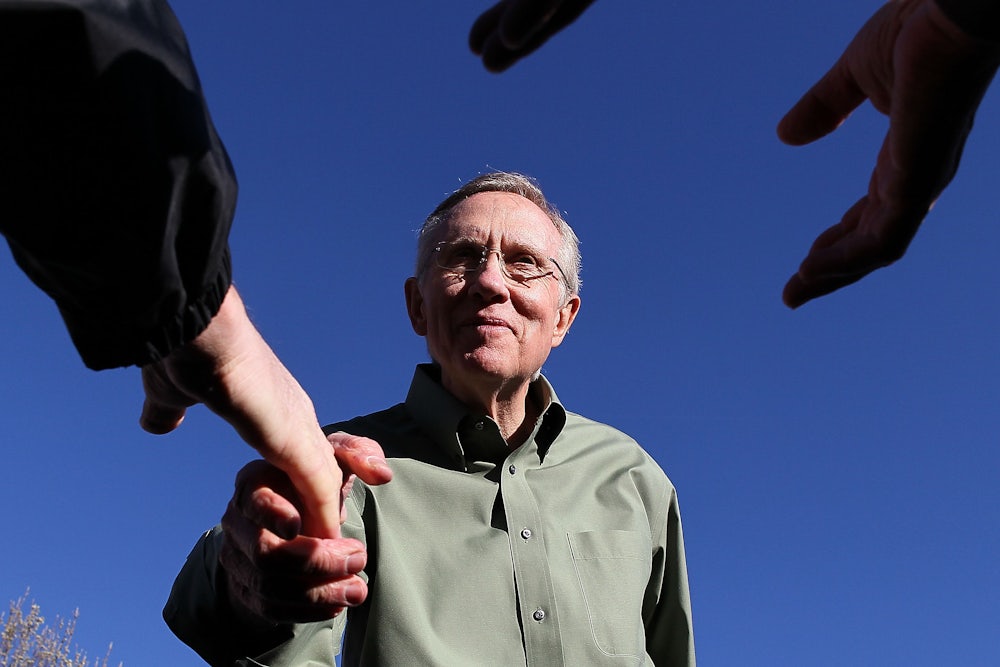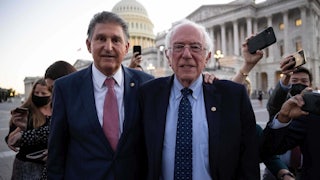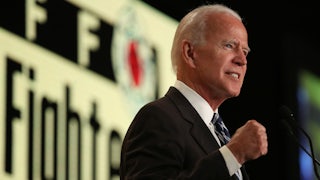Some people keep talismans in their wallets to remind them of those they love: a romantic letter, a set of dog tags, a family picture. Senate Majority Leader Harry Reid has such a token—but it’s to remind him of the people he hates.
When I interviewed the Nevadan in March in his mahogany-toned office off the Senate floor, we cycled through the standard exchanges. Then I asked whether he has a lucky charm. The usually grave Nevada senator smiled, raised his eyebrows, and, fumbling for his wallet in the pocket of a smoothly pressed blue suit, plucked out a ragged-edged, smudged scrap of paper, home-laminated with strips of Scotch tape. “Medicare has no place in a free world,” he began to read off the scrap. “Social Security is a rotten trick!”
Reid’s lucky charm, it turned out, was a list of brazen quotes uttered by old-school Republican hard-liners. There are riffs from Dick Armey, Bob Dole, and even Newt Gingrich (that Medicare would “wither on the vine” under Republican rule). Reid keeps the scrap private, except when it might deliver a political punch. “He pulled it out on me in a meeting in 2005 about Medicare,” recalls one Democratic activist who has seen the keepsake emerge at more than one progressive strategy session. “He’ll say, ‘I keep this in my wallet to remember who these people are.’” Inside such meetings, the effect can be dramatic. “It’s like, wow, Harry Reid’s got an axe to grind with Republicans,” the activist explains.
Out in the broader world, though, it’s just this kind of cocksure vigilantism that’s given Reid a miserable reputation. Since taking over for Tom Daschle in 2005, Reid’s hyperbolic public outbursts have become a regular feature of the political landscape—like when he called Clarence Thomas an “embarrassment” (on NBC), Alan Greenspan “one of the biggest political hacks we have here in Washington” (on CNN), and George W. Bush a “liar” (at a presser at the Heavenly Ski Resort) and a “loser” (in a Las Vegas high school civics class).
In another man, such pronouncements might sound feisty, but Reid’s demeanor dooms him to an irascible, misanthropic image: A slouched former boxer, he often speaks too softly, as if he’s sulking and might erupt at any moment; he rarely smiles, and his eyelids are perpetually pink and narrowed to slits. Amazingly, for years he has ranked well below Bush in CNN’s favorability ratings poll, and his Nevada numbers aren’t much better, provoking titters that a Republican could oust him in 2010. After he touched off a firestorm in 2007 by declaring the Iraq war “lost” in the middle of the Senate’s negotiations over war funding, a disgusted David Broder dubbed him the Democrats’ own Alberto Gonzales. More recently, Broder’s Washington Post colleague David Ignatius concluded that Reid is the “pugilistic” epitome of a petty Democratic “Get-Even Gang” on the Hill, and that the party’s only hope is for Barack Obama to trample him.
The reviews are so bad it seems almost impossible that Reid has survived as Senate leader. But, though Reid is disliked by the people, his Democratic Senate colleagues adore him. “He’s a natural leader,” centrist Senator Max Baucus of Montana raved to me last week. Senator Barbara Boxer of California is no less effusive. “I’ve served under many leaders, and nobody’s kept us as close as Harry,” she told me. Calling around K Street, I found that former aides to Democratic senators remembered Reid the same way: as “brilliant,” “deliberate,” “communicative,” and “the ultimate patient listener” with “a gentle sense of humor.” A gentle sense of humor? Were we talking about the same Harry Reid?
This split reputation is the strange mystery of Harry Reid. The secret of his success in the Senate is that he is not remotely the same man there as he is in public. As the Democratic Party becomes more and more peppered with mavericks, centrists, and defectors, Reid—the guy who plays the hyper-partisan moralist crusader on television—turns the other cheek on the Hill. To co-opt the disloyal, he not only tolerates them: He rewards them.
The simplest part of Reid’s strategy in the Senate is to excel at pure gentility. Anyone who helps the group is publicly congratulated or thanked. Democratic gatherings, like the weekly Senate caucus luncheons, proceed “like a synagogue meeting, where everyone’s like, ‘Thank you for donating the Kiddush, ‘” explains one former top Senate aide. Even when Reid can’t deliver a senator his heart’s desire (as when Wisconsin’s Russ Feingold wanted the Senate Democrats to insist on pulling American troops out of Iraq), Reid looks for a way to respect the wish: Feingold’s end-the-war amendments always lost, but they always got a vote. Reid also seems to find something to interest him in every senator. Nebraska Senator Ben Nelson, a hunter, relates his chats with Reid: “He asks me how my family is, and we talk about what’s going on—and he wants to know what I’ve shot lately.” Baucus marvels, “On occasion he’ll just call up as a friend to say ‘Hi, how are things going,’ rather than call and ask me to do something. ... I’ve never gotten a call like that from another senator. ... Just a few days ago, we talked about Cormac McCarthy and the book he wrote, The Road, and how much we both love that book.”
Reid isn’t only being a nice guy. He uses this gentility to woo wayward Democrats back to the party line. This was Reid’s biggest challenge during the Bush years, and no one was the object of his sweet-talking ways more than Max Baucus, Montana’s maverick cowboy senator who has made a career out of going rogue on his fellow Democrats. In 2001, Baucus teamed up with Iowa Republican Chuck Grassley—one of his best friends in the Senate and his counterpart on the powerful Finance Committee—to hand Bush his massive tax-cut plan essentially untouched; in 2003, he joined a negotiating session on Medicare as a scab after Republicans locked the Democratic leadership out of the room. Daschle reportedly was apoplectic. But, when Reid took over as minority leader, in 2005, he tapped Baucus, of all people, to face down Bush’s effort to privatize Social Security. “He just said, ‘Max, I want you to take the lead in fighting this nutty privatization idea,’” Baucus remembers, his voice full of pleasure. “It was music to my ears, because I wanted to take the lead! ... I relished the charge.”
The choice had seemed crazy. But Baucus threw himself into the effort, and his campaigning helped keep other Democratic moderates on the wagon. Even Republicans ended up fleeing the president’s plan. It was the Democrats’ biggest policy triumph since Bush took office. When asked whether Reid’s charge was an empowering moment, Baucus crows, “That’s an understatement. I loved it! President Bush flew out to Great Falls, Montana, touting his plan. I think,” he snickers conspiratorially, “he went to Montana because of me.”
Reid has been known even to encourage moderates’ dalliances privately while playing the partisan for the cameras. At a Senate Democratic luncheon after this year’s $787-billion economic stimulus package passed Congress, Reid took a few minutes to acknowledge Ben Nelson’s contributions—despite the fact that, by negotiating with Republicans to strip $100 billion from the original plan, Nelson had done more to undermine the Democratic version of the stimulus than to support it. It turned out, however, that Reid himself had encouraged Nelson. “Publicly, he gets out there saying the moderates are screwing up the process,” says a Nelson friend. “But, behind the scenes, he’s encouraging us—’Get a deal, get a deal, get a deal.’” It’s a perfect play: Nelson “gets to go up there and be the maverick, but he’s actually working with Reid,” the friend explains.
Perhaps the apogee of Reid’s practice of forgiveness was his handling of Joe Lieberman. Although he claimed that Lieberman’s behavior after he endorsed John McCain made him furious—”I defy anyone to be more angry than I was,” he told reporters—in practice, he was nothing if not kind. When Lieberman called him up in July to say that he would be speaking at the GOP convention, Reid didn’t chew him out but simply explained why he wouldn’t vote for McCain. And when, after McCain lost, Lieberman wanted to retain not only his place within the Democratic caucus but his Committee on Homeland Security chairmanship, Reid lined up a group of character witnesses, including freshman senators Jeff Merkley and Tom Udall, to defend him in front of other Democratic senators. “He was infatuated with John McCain, and he did some things he regrets,” Reid tells me with a shrug. From Reid’s point of view, this generosity was simply a practical move: Lieberman was necessary to woo Republican Susan Collins; without him, “we never would have passed the economic recovery package.”
Among Democratic senators, Reid’s gentility seems to promote intense goodwill. After Broder published his broadside comparing Reid to Gonzales in the Post, Chuck Schumer became so agitated he decided to gin up a petition of senators in protest. “There almost was a line on the floor of the Senate,” Schumer recalls. “I got everybody’s signatures within a few hours. Even Lieberman’s.”
Reid’s gamble is that yielding to his members in the short term will bring not only personal loyalty but political benefit as well, that a sort of Swiss Family Robinson spirit will develop within the caucus. And there’s some evidence of success: After Democrats had suffered defeat after humiliating defeat trying to get a piece of Iraq legislation past the caucus’s own moderates and the Republicans up to President Bush for a veto showdown, Reid asked Nelson—the epitome of an Iraq centrist—to do him a crucial favor and vote for a 2007 emergency war-funding bill that included a troop withdrawal timetable, ensuring its inclusion in the final version that went to the president. “Senator Reid was able to talk to Senator Nelson and explain to him how we needed to have this debate [with Bush],” says a leadership aide.
It seems Reid’s courtship also has loosened Baucus’s unbending loyalty to Grassley, long an obstacle to forcing liberal legislation through the Finance Committee. When the State Children’s Health Insurance Program came up for renewal in January, for instance, Baucus did Reid’s bidding in extending the benefits to legal immigrants despite Grassley’s wild opposition. And, just this summer, Baucus blew off Grassley’s overtures on a plan to subsidize doctors’ Medicare payments. At a press conference after the bill passed, Reid praised Baucus for being a big boy. “He stood tall, and I am so proud of the chairman of our Finance Committee,” said Reid.
This latitude, of course, has its risks. In December 2007, the Democratic plan to roll back oil and gas subsidies came up one vote short due to the defection of Louisiana Democrat Mary Landrieu. “Insiders say that even behind closed doors, Reid does not demand that Landrieu fall in line with the party’s energy agenda,” Congressional Quarterly reported. And, last January, when Democrats were negotiating a stimulus bill with President Bush, Reid handed Baucus the task of writing his own package on behalf of the Senate; the resulting plan blithely handed tax rebates to the fabulously rich, at Grassley’s request. The Democratic caucus publicly recoiled, giving a damaging impression of intra-party confusion. “[It] causes me to want to gag, okay?” Reid himself barked to reporters. (But Baucus’s perfidy didn’t seem to hurt the Reid-Baucus relationship a bit. “He has the patience of Job,” Baucus rhapsodizes.)
Since Obama took office, though, some of the conditions that allowed Reid to court moderate Democrats have vanished. He’s not leading his troops in an easy offense against a weakened Bush, putting up bills fated for veto and intended as political gamesmanship. Today, senators who sign on to the Democrats’ ambitious proposals—projects like health care reform or cap and trade—will be held responsible back home. Already, some centrists are balking. Blanche Lincoln, Mark Pryor, and Landrieu have all backed off their former support for the Employee Free Choice Act, forcing Reid to dump an idea to bring it to the Senate floor.
The bigger shortcoming of Reid’s gentlemanly approach is that Republicans remain impervious to his charms. That doesn’t mean Reid hasn’t tried. Starting this term, Reid changed his approach to the procedural rules he uses to allow the GOP to offer amendments to Democratic bills. He has also, of course, let the GOP force essentially every serious bill to cross the 60-vote filibuster bar. Nate Silver, FiveThirtyEight.com’s political statistician, has calculated that the Senate voted on 112 cloture motions in the 110th, Reid’s first term as majority leader, twice the number in the previous Congress and more than double the average number over the previous 20 years.
The day I met Reid in his office, he was struggling to round up 60 votes on the omnibus budget bill, which he’d earlier vowed he’d bring to a vote that night. In the middle of a chat about poetry in front of his crackling fireplace—”Who’s your favorite poet?” he’d asked me eagerly after I mentioned a poem he loves by Emily Dickinson, “There Is No Frigate Like a Book”—an aide’s hand thrust a yellow Post-It note through the heavy door, and Reid rose mid-sentence to call a wavering senator. “Any luck?” I asked, when he came back in. “No luck, “ he replied, almost chipperly. Reid didn’t seem angry or worried: He and his fellow Democrats expected that moderate Republicans could ultimately be swayed, perhaps by Reid’s generosity in allowing the GOP to offer copious amendments. (“Harry’s been eminently fair,” another senator whispered to me confidently that day.) But they weren’t moved. By that night, the magic 60 hadn’t materialized, and Reid sent his senators home for the weekend empty-handed.






